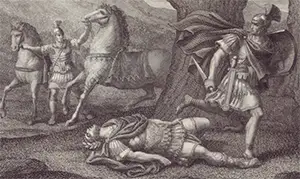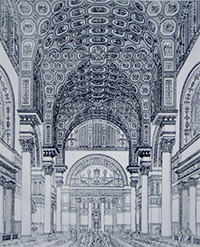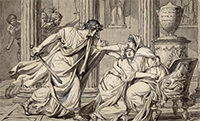The Roman Emperor Caracalla
Caracalla was a Roman emperor in the 3rd Century. Known for his cruelty, he ruled for just six years but left behind an egalitarian legislative achievement and a monumental public bath complex. 
He was born Lucius Septimius Bassianus on April 4, 188, in Lugdunum, in Gaul. His father, the future emperor Septimius Severus, was the governor of Gallia Lugdunensis at the time. Severus became emperor in 193. Two years later, he changed his older son's name to Marcus Aurelius Antoninus, to link his own rule to the previous dynasty, which passed the throne from father (Marcus Aurelius) to son (Commodus. Also at this time, Severus named his older son his official heir. When the boy was 10, his father named him co-ruler. Severus had a second son, named Geta, who was born just 11 months after his first one, Antoninus. The brothers did not have an amicable relationship when they were growing up, and this enmity extended into their adult lives. Severus forced Antoninus at age 14 to marry Fulvia Plautilla, the daughter of Severus's close friend Plautianus. The married couple despised each other but did have a daughter together. In 205, when Plautanus was executed for treason, Fulvia was sent into exile. 
In 208, news of unrest in Brittania came to Rome, and the emperor decided to take both of his sons with him on campaign there. Antoninus took part in the fighting, and Geta (right) was in charge of the civil administration. Severus died, on Feb. 4, 211. As was his wish, his sons were proclaimed co-emperors. Their first act was to end the fighting in Britain, returning the border to Hadrian's Wall. They returned to Rome but could not agree on how to share power or even on how to make basic political decisions, like appointing government officials. (The one thing they did agreed on, a geographical division of the In 213, the newly sole emperor went on campaign, leading legions into the north. He turned back incursions by the Alamanni and strengthened the frontier defenses in the Agri Decumates. It is on these campaigns that he is thought to have been given the name Caracalla, in deference to a kind of hooded tunic that he had taken to wearing. He turned next to the east, where he envisioned himself succeeding as another Alexander the Great. He took to styling himself like the famous Macedonian king and conqueror and sought to win great victories in that part of the world. He began this quest by visiting Alexandria. Faced with derision, he lost his temper and ordered great slaughter and plunder in the city. He then targeted the Parthians, who were greatly diminished by this time, despite have been great enemies of Rome in times past. In keeping with his mania for Alexander, he ordered his soldiers to form into phalanxes (even though Rome had proven that the legion was superior to the phalanx time and again). Caracalla resorted to trickery and cruelty once he reached Parthia in 216. He first offered to marry a daughter of King Artabanus V; then, when he was rebuffed, he asked the king and a number of advisers to attend what they thought was a weapons-free peace negotiation and then had the Parthian king and nobles slaughtered. Remarkably, the king escaped. 
Leading his troops on into Media, Caracalla made an enemy of Macrinus, his Praetorian Prefect. The two men did not like each other or much get along. Then, Caracalla was told of a prophecy that Macrinus would one day become emperor. The two men decided to target each other. Macrinus struck first, ordering one of his men to kill Caracalla while the troops were stopped by the side of the road to Carrhae. Caracalla died, on April 8, 217, as he was relieving himself. The prophecy then came true, as Macrinus was indeed the next Emperor of Rome. For all his cruelty, Caracalla did make two lasting positive contributions to the Roman legacy. In an Edict of 212, he declared the Constitutio Antoniniana, or Antonine Constitution, which gave to all men living freely in the Empire the status of full Roman citizenship. Critics have argued that it didn't hurt that having more citizens on the tax rolls could generate more revenue for a royal treasury that was sorely lacking. At the same time, it was still a stroke of equality that instantly made Roman citizens of a great many people who could only dream of such a status. 
His other lasting contribution was the construction of a very large baths complex. Building began in 211, at the start of his reign, and the inauguration came in 216. Completion of the original design came two decades after construction began. Covering 62 acres, they were the Empire's second-largest bath complex and could accommodate up to 8,000 bathers a day. The complex also had other buildings, such as a library, and areas for other physical activities, such as walking and other forms of exercise. |
|
Social Studies for Kids
copyright 2002–2026
David White



 empire, was vetoed by their mother, whom they still revered.) Each had his own group of support, and tensions ran high. Their mother tried to keep the peace, but both brothers were obstinate and eventually sought to become sole ruler. Antoninus succeeded in this on Dec. 26, 211, having his brother murdered in the midst of a family gathering; Geta died in his mother's arms. Antoninus then ordered a purge of a great many of Geta's supporters. In a final act of supreme kindness, he ordered his brother's name and image stricken from official written accounts of the state. His face disappeared from coins and paintings. Statues of him were struck down. Even speaking his name was a capital offense.
empire, was vetoed by their mother, whom they still revered.) Each had his own group of support, and tensions ran high. Their mother tried to keep the peace, but both brothers were obstinate and eventually sought to become sole ruler. Antoninus succeeded in this on Dec. 26, 211, having his brother murdered in the midst of a family gathering; Geta died in his mother's arms. Antoninus then ordered a purge of a great many of Geta's supporters. In a final act of supreme kindness, he ordered his brother's name and image stricken from official written accounts of the state. His face disappeared from coins and paintings. Statues of him were struck down. Even speaking his name was a capital offense.
